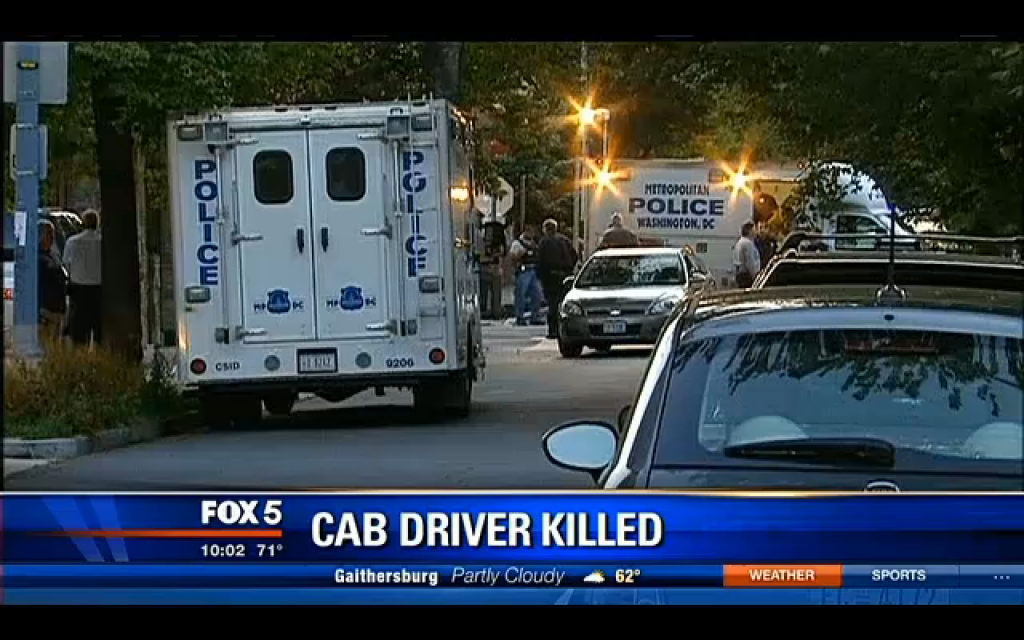 The Taxi Link airs Sat. 7-8 pm on WUST 1120 AM. Listen here:
The Taxi Link airs Sat. 7-8 pm on WUST 1120 AM. Listen here:
Audio clip: Adobe Flash Player (version 9 or above) is required to play this audio clip. Download the latest version here. You also need to have JavaScript enabled in your browser.
Solomon Okoroh, a 57-year-old father of five, was shot and killed while driving his cab early Tuesday morning in D.C.’s Adams Morgan neighborhood. “He’s a good father. He’s a good provider. He’s friends with everyone,” said Evelyn Ruiz, owner of Classic Cab, the company for which Okoroh drove for fifteen years. “If you need help, he comes running to help you out,” Ruiz said, using the present tense to describe her recently deceased friend.
Okoroh, who was originally from Nigeria, was known to pick up all fares, which may have got him killed. While many are quick to label cab drivers as racist, there’s scant attention paid to the very real dangers they face, as a D.C. Council hearing made clear.
“Do you have any data for us about drivers’ safety?” asked D.C. Councilmember Mary Cheh, chair of the Committee on Transportation and the Environment. Her question was directed to Ron Linton, chairman of the D.C. Taxicab Commission. “No, we don’t,” said Linton.
“I’m dismayed that we have a system in place where we have so little data on all of this,” Ward 1 Councilmember Jim Graham told Linton. “The question is, how prevalent is this problem of attacks on cab operators?” asked Graham. “And right now we’re at sea… we don’t know.”
The Committee on Transportation and the Environment’s hearing was supposed to be about passenger safety only, but in the wake of Okoroh’s murder the focus shifted to driver safety. “It is tragic that it takes someone to die for them to even start taking an interest,” said The Taxi Link co-host Tony Norman.
According to the Council’s website, the basis for the hearing was the taxi commission’s claim that it “receives approximately 150 complaints per month, 80% of which are from women who feel threatened, harassed, or unsafe in taxicabs.” But as the hearing went along, “It became clear the commission records didn’t back up the statistics,” noted Tom Sherwood in his report for NBC 4.
“What you have today [is a] statistical report based on my off the top of my head remembrance,” explained Linton.
While it went unmentioned during the hearing, this isn’t the first time Linton has made unsubstantiated allegations about drivers abusing female passengers. Last March Linton told ABC 7, “What we’re seeing is an increase in [drivers] physically manhandling their fares… Striking them. Pulling them out of their cabs.” Despite repeated requests, the taxi commission didn’t provide evidence backing up Linton’s allegations.
“It’s a visible pattern,” said Mechal Chame, board member of The Small Business Association of DC Taxicab Drivers. It’s part of a “campaign of what you call character assassination.”
Meanwhile, drivers continue to be subjected to an unknown number of assaults. At Wednesday’s hearing, officials offered several well-meaning solutions to reduce attacks on drivers. Graham called for a glass partition to be placed between the front and back seats, like in NYC. And Linton once again called for the installation of panic buttons. But drivers, who have the most expertise in this area, mostly feel these suggestions won’t provide them with much security.
While safety issues may be new to officials, they are a daily reality for drivers. The chief concern among drivers is their lack of standing with the taxi commission and police, neither of which takes assaults on operators seriously, according to drivers. “Most drivers don’t even bother… calling the police if an incident happens,” longtime driver and D.C. Taxicab Commission member Stanley Tapscott told The Taxi Link last month.
This lack of vigorous follow up turns cab drivers into sitting ducks, since would-be-robbers know they’re unlikely to be caught if they target drivers.
In such an environment, Evelyn Ruiz feels that there should be a relaxation of some of the punishments and fines drivers face for not picking up a fare. “There’s got to be a way to wave some of these regulations when the driver feels that his life is in danger,” she said.
“Drivers pick up complete strangers at all times,” said Ruiz. “They are just hoping and praying that all fares that they pick up are legitimate passengers. They go out on the street to make money. These drivers do not discriminate. They are not biased. They are not racist. When they see a passenger, they pick [them] up. However, there are some times that their gut says that this is not a good fare, it’s not a legitimate fare.”
Details for Mr. Okoroh’s service are still being worked out. For more information, contact Classic Cab at (202) 399-6815. Donations to the Okoroh family can be sent c/o…
Classic Cab Company 1729 Bladensburg Rd, NE Washington, DC 20002
The Taxi Link airs Saturday 7-8 p.m. on WUST 1120 AM. The show is sponsored by The Small Business Association of DC Taxicab Drivers; hosted by TheFightBack’s Pete Tucker and D.C. Advisory Neighborhood Commission 1B chairman Tony Norman; produced by Will Martin; and engineered by Mark Taylor, with special thanks to Stefan Ilie
